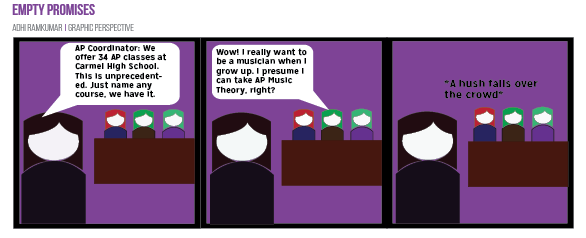
While skimming the program of studies in the process of scheduling for next year, I noticed a glaring discrepancy within the performing arts section. Known for its histo ry of excellence, the CHS performing arts department offers students an extensive array of advanced musical ensembles. However, when it comes to instructing students in the fundamentals of music, CHS is seriously lacking in advanced music theory.
ry of excellence, the CHS performing arts department offers students an extensive array of advanced musical ensembles. However, when it comes to instructing students in the fundamentals of music, CHS is seriously lacking in advanced music theory.
Of the 40 AP courses the College Board offers, CHS currently offers 34. Despite this variety of AP courses available to students, CHS fails to offer students an AP Music Theory course. Although students can sign up to take regular music theory, this course lacks the rigor and depth of a college-level course. The College Board compares AP Music Theory’s intensity to that of a beginning level college music theory course. For students considering studying music in college, this kind of advanced music theory course would provide tremendous benefits. Students could possibly fulfill required credits in college, helping them to graduate sooner and lessen the cost of tuition.
Music Theory’s intensity to that of a beginning level college music theory course. For students considering studying music in college, this kind of advanced music theory course would provide tremendous benefits. Students could possibly fulfill required credits in college, helping them to graduate sooner and lessen the cost of tuition.
In addition to this, many colleges require auditioning students to complete a music theory exam on the day of their audition, or they will assess specific aspects of the student’s music theory knowledge another way. For example, students auditioning for vocal performance at New York University, University of Michigan, the Curtis Institute of Music or DePauw University, to name a few schools, will all be required to complete a sight-singing portion of their audition; sight-singing is a skill taught and emphasized in AP Music Theory. Furthermore, this aspect of the AP Music Theory course is merely one demonstration of how skills taught in AP Music Theory could serve students beyond the walls of CHS. Other skills include advanced aural, compositional and analytical skills, which according to the College Board, can lead to a future in 65 different career areas.
If the benefits of offering AP Music Theory are not yet obvious, consider CHS’s AP offerings compared to those of surrounding schools. As a school known for its strong AP program, it’s astonishing to see Westfield, Noblesville, Zionsville Community, Hamilton Southeastern, Fishers, North Central, Lawrence Central, Lawrence North, Park Tudor, Cathedral, Herron and Ben Davis high schools all offer AP Music Theory while CHS does not. What’s more, these schools offer fewer total AP classes than CHS, demonstrating the importance and advantage of implementing AP Music Theory within their curriculum. Not only does this show disparity between CHS and nearby schools, but it also puts CHS students who are seriously pursuing music at a disadvantage.
Overall, the addition of AP Music Theory at CHS would be a major asset to the school. With the tremendous advantages this course would offer to students pursuing music, I hope to encourage CHS to seriously consider implementing AP Music Theory into its curriculum.
Quick Quiz on Music Theory: www.hilite.org/quick-quiz-music-theory
































![What happened to theater etiquette? [opinion]](https://hilite.org/wp-content/uploads/2025/04/Entertainment-Perspective-Cover-1200x471.jpg)














































![Review: “The Immortal Soul Salvage Yard:” A criminally underrated poetry collection [MUSE]](https://hilite.org/wp-content/uploads/2025/03/71cju6TvqmL._AC_UF10001000_QL80_.jpg)
![Review: "Dog Man" is Unapologetically Chaotic [MUSE]](https://hilite.org/wp-content/uploads/2025/03/dogman-1200x700.jpg)
![Review: "Ne Zha 2": The WeChat family reunion I didn’t know I needed [MUSE]](https://hilite.org/wp-content/uploads/2025/03/unnamed-4.png)
![Review in Print: Maripaz Villar brings a delightfully unique style to the world of WEBTOON [MUSE]](https://hilite.org/wp-content/uploads/2023/12/maripazcover-1200x960.jpg)
![Review: “The Sword of Kaigen” is a masterpiece [MUSE]](https://hilite.org/wp-content/uploads/2023/11/Screenshot-2023-11-26-201051.png)
![Review: Gateron Oil Kings, great linear switches, okay price [MUSE]](https://hilite.org/wp-content/uploads/2023/11/Screenshot-2023-11-26-200553.png)
![Review: “A Haunting in Venice” is a significant improvement from other Agatha Christie adaptations [MUSE]](https://hilite.org/wp-content/uploads/2023/11/e7ee2938a6d422669771bce6d8088521.jpg)
![Review: A Thanksgiving story from elementary school, still just as interesting [MUSE]](https://hilite.org/wp-content/uploads/2023/11/Screenshot-2023-11-26-195514-987x1200.png)
![Review: "When I Fly Towards You", cute, uplifting youth drama [MUSE]](https://hilite.org/wp-content/uploads/2023/09/When-I-Fly-Towards-You-Chinese-drama.png)
![Postcards from Muse: Hawaii Travel Diary [MUSE]](https://hilite.org/wp-content/uploads/2023/09/My-project-1-1200x1200.jpg)
![Review: "Ladybug & Cat Noir: The Movie," departure from original show [MUSE]](https://hilite.org/wp-content/uploads/2023/09/Ladybug__Cat_Noir_-_The_Movie_poster.jpg)
![Review in Print: "Hidden Love" is the cute, uplifting drama everyone needs [MUSE]](https://hilite.org/wp-content/uploads/2023/09/hiddenlovecover-e1693597208225-1030x1200.png)
![Review in Print: "Heartstopper" is the heartwarming queer romance we all need [MUSE]](https://hilite.org/wp-content/uploads/2023/08/museheartstoppercover-1200x654.png)


